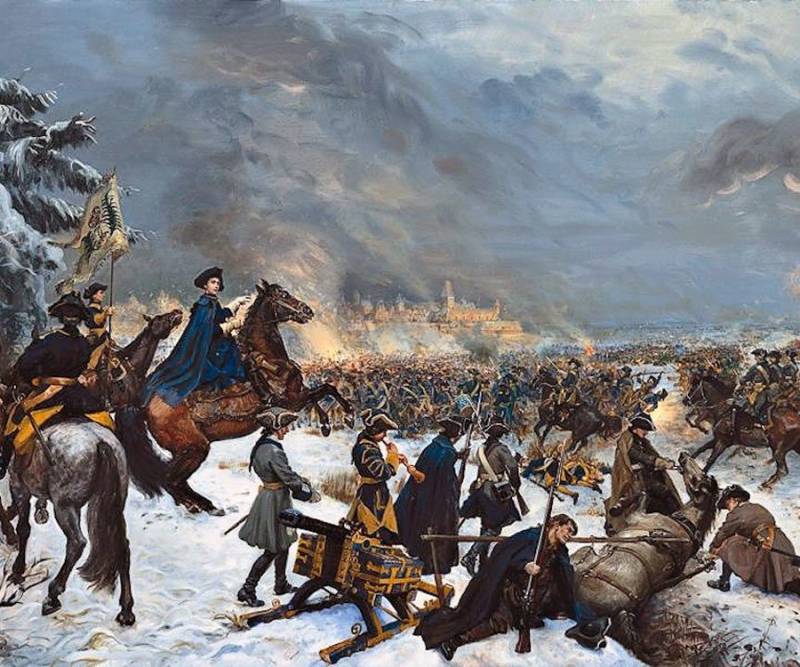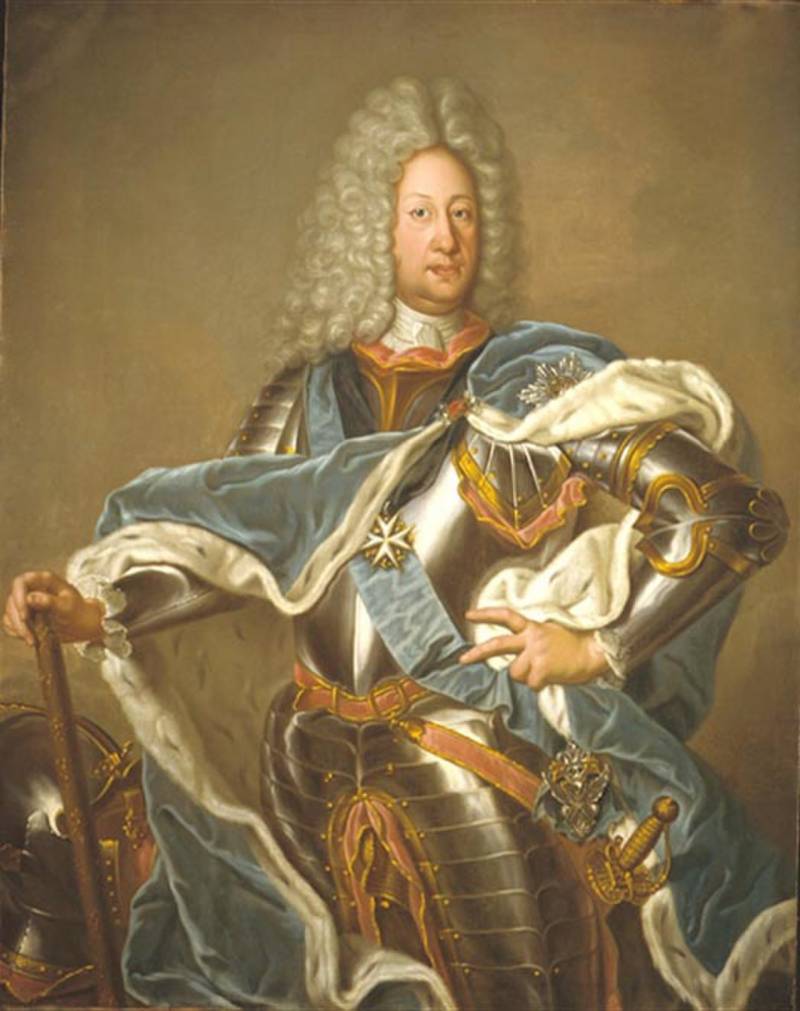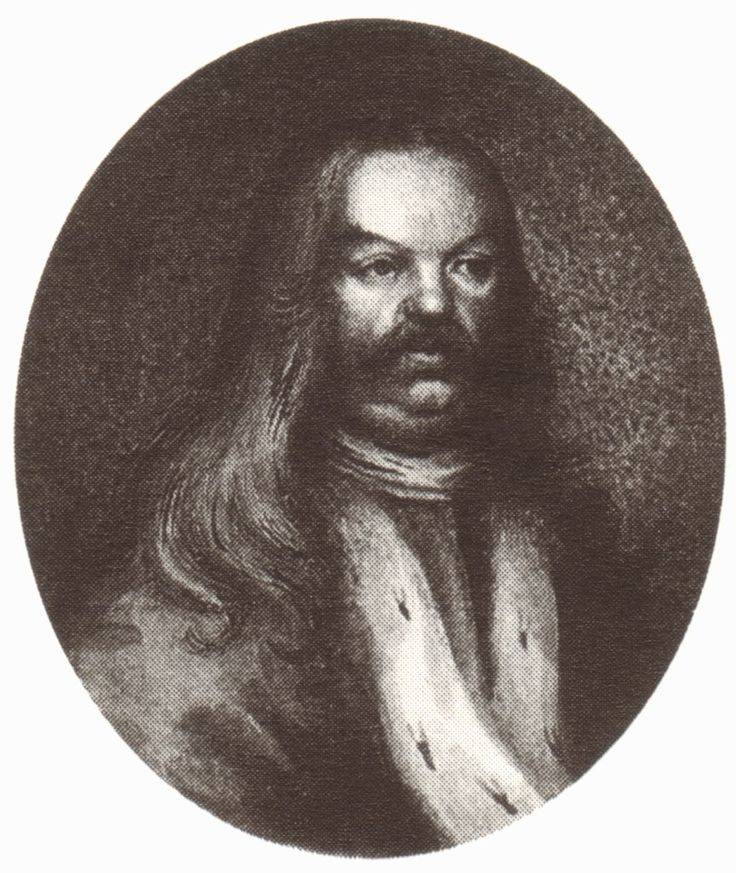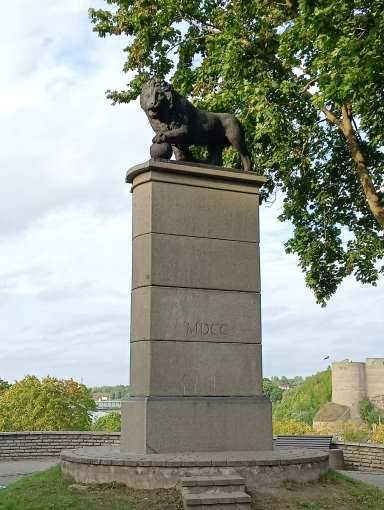Battle of Narva 1700

who is determined to win it.”
L. N. Tolstoy
This article is devoted to two episodes of the Northern War or, as it is also called, the Twenty Years' War, and among the Swedes - the Great Northern War.
A small prehistory
Peter I joined the “Northern Alliance”, created on the initiative of the Elector of Saxony and the Polish king. The union included the Danish-Norwegian kingdom, but the Polish-Lithuanian Commonwealth did not participate in the war. Each side solved its own problems.
The Saxon army (August II, Polish king) besieges Riga, the Danish king besieges Friedrichstadt in Schleswig.
After signing the Peace Treaty of Constantinople with the Ottoman Empire, Tsar Peter declared war on Sweden and on August 19 (30), 1700, he set out on a campaign against Narva.
In March 1700, the Danish king Frederick IV invaded the Duchy of Holstein-Gottorp in the south of the country. However, 10 thousand Swedish soldiers under the command of King Charles XII, unexpectedly for the Danes, landed near Copenhagen, and Denmark was forced to conclude the Travendal Peace Treaty on August 7 (18) and abandon the alliance with Augustus II.
The siege of Riga by Saxon troops was initially sluggish, and even the arrival of Augustus II near Riga in mid-July 1700 did not improve the situation. The news of Denmark's surrender forced the Saxon Elector to lift the siege and retreat.
Russia, surprisingly, was left alone with the strongest army of the then Europe, and perhaps the world.
Russian troops are building a double earthen rampart from the west of Narva, which protects them both from Narva and from the west from a possible attack by the Swedes. The edges of the shafts abut the Narova.
The total number of Russian troops, according to various estimates, is from 34 to 40 thousand. The number of guns is slightly less than 200.
Narva was defended by a garrison of about 2 people with 000 guns. Garrison commander Rudolf Horn.
On October 20 (31), the Russian army began regular shelling of the fortress. The effectiveness is extremely low, as Swedish sources report, during this time 3 unsuccessful assaults were launched.
At the time of the siege of Narva, the number of Swedish troops in this region was insignificant. The only large detachment under the command of Otto Wehling, about 8 people, was located on the territory of modern Latvia in the small town of Ruiena. It was this detachment that annoyed the Saxon Elector.
Charles XII arrived in Pärnu along with his troops on October 5 (16), that is, a month before the main battle. He decides to give the main forces a long rest. A cruise in the Baltic in late autumn is another pleasure.
And on October 12 (23) he himself arrived in Ryuevel (Ruiena) and ordered Otto Welling with the main forces of his detachment to move northeast to Wesenberg (Rakvere).
Then on October 25 (November 5) he arrived in Revel, where he met with local residents. Charles promised the Estonians additional privileges within the Kingdom of Sweden, and Revel allocated 5 militia for the Swedish army. The gathering of the entire army was scheduled at Wesenberg.
That's the end of the little preface.
Boris Petrovich Sheremetev
Here the hero of the first part of the article appears, Boris Petrovich Sheremetev.

Having learned about Karl's landing in Pärnu, Peter sends him with a cavalry detachment (5-6 thousand) to meet the enemy. Without encountering resistance, the future count took up positions in the area of the Wesenberg fortress (Rakvere) by October 3 (14). Naturally, there is a Swedish garrison in the fortress. What tasks did Tsar Peter I set for Boris Sheremetev, I did not find in the available sources. Some write - intelligence.
The Swedes are more specific. The year 1700 was a lean year in Estonia, and Sheremetev’s detachment had to devastate the already meager supplies of food in the area from Narva to Rakvere (Wesenberg).
In early November, a detachment of 600 men was sent from Wesenberg under the command of Majors Georg Patkul and Hans von Tiesenhausan, which was supposed to stop the actions of the Russian cavalry to devastate the area.
Having learned about the approach of the main Swedish troops to Wesenberg, Boris Sheremetev with his detachment retreats across the Purtse River, which is about 40 km from Wesenberg. Leaving small garrisons in Purtse, Varje (Variel) and Aa (Gakgof), he and his main forces settled in the village of Povanda, present-day Kotla-Jarve.
On October 25 (November 5), a detachment of Swedes attacked the village of Purtse and captured it. On the evening of October 26, the Swedes attack the garrison in Varje. And again, the Russian soldiers offered virtually no resistance to the Swedes; some of them barricaded themselves in peasant houses, where they were burned alive by the Swedes, but some managed to gallop off to Powanda.
Having learned about what happened, Boris Sheremetev sends a detachment (21 squadron) to Varya. Russian squadrons surrounded Varya, but the Swedes fought their way out of the encirclement, but some of them were captured by the Russians. Including Major Patkul, who during interrogation gives false testimony about the size of the Swedish army moving towards Narva. 30–000 people – he announced.
Despite the success in this battle and numerical superiority, Sheremetev, instead of gaining a foothold in Purtse, retreated from it 40 km to the village of Pyukhaiye. Peter was extremely dissatisfied with such actions and showered Sheremetev with severe reproaches. The latter justified himself that “there are untold swamps and swamps there.”

The diagram is clearly a remake, where the location of the villages is indicated correctly. Roads and roads are indicated, supposedly these are roads through swamps.

Screenshot of the same area from a Google satellite image at the time of writing. We hardly see any swamps, and the wooded part is only in the eastern part of the image. Moreover, this is the upper part of the cliff, and the fertile layer here is no more than a meter. The villages mentioned in the article are circled in green. Red is the road to Narva, and yellow is to Vasknarva (Syrenets) and through the fords to the right bank of the Narova.
November 12 Karl leaves Wesenberg. The number of his army is 11 people. Some of the Swedish generals are trying to dissuade Karl from waiting for reinforcements; there are rumors that a Russian army of 000 people is moving towards Narva and the eastern part of Virland is completely plundered and houses are burned. Karl orders that you take four days' rations with you and leave everything you need behind. The army is accompanied by a small convoy. In modern language, Karl takes a one-way ticket.
On November 16, the Swedish vanguard encountered Sheremetev's cavalry at the Pühajõe crossing; when Charles arrived, he ordered the guns to be rolled forward. Seeing these preparations, Sheremetev ordered a retreat. And the main forces of the Swedes calmly crossed the river. This event is known among the Swedes as the “Pyhajõgi fashion show”.

A modern bridge on the site of an old crossing.

The field on which the Russian cavalry positions were located.
The position near the Pyhajõgi River was indeed well chosen, and if Sheremetov and his detachment had accepted battle here, he “could have offered significant resistance and forced the enemy to deploy his forces and suffer considerable losses” (A. Petrov, 1872).
On November 17, in the Laagna area, the Swedish vanguard encountered an outpost of Russian troops and mistook it for the entire Russian army, which forced the Swedes to line up and take combat readiness. When the mistake was discovered, it was already evening, and the Swedes set up camp there.
On the night of November 18, Swedish reconnaissance approached the Russian fortifications, studied their location, measured the height of the ramparts and the depth of the ditches.
On the morning of November 19 (30), Charles’s army left the camp near Laagn and by one o’clock in the afternoon (sunset on November 30 at 16:10) was in the Hermannsberg area, which is 1 kilometer from the Russian fortifications.

The purpose of this article does not include a description of the assault on Russian fortifications in the Narva region.
I was surprised by the actions of the commander of the cavalry detachment, Pyotr Borisovich Sheremetev. In the two weeks that preceded the general battle, he controlled the only road that went from Wesenberg to Narva. Having a cavalry detachment of half the size of the Swedes' army and using natural barriers in the form of rivers (Purtse and Pyhajõgi) and more, he could force a battle and thereby change the course of the war itself. But for some reason he didn't. Didn't even make an attempt.
Historians justify his behavior by the fear of being surrounded and the difficulty of movement (there are swamps and swamps all around). Both arguments are untenable. It feels like the Swedes moved along the highway, and the Russians through the swamps.
Most likely, it was initially clear to many that the Narva campaign was a failure. The Russian army was left alone with the strongest army in Europe, all allies “merged”, preparations for war took place in a hurry. There was only enough gunpowder and shells for 2 weeks of shelling of the fortress with various caliber artillery. Three unsuccessful assaults. And finally, the news that Karl with an army of 50 thousand was moving towards Narva did not add courage and heroism. Peter's departure - and this goes into the same piggy bank.
Sheremetev's cavalry retreated almost 50 km along the left bank of Narva to Syrensk, now it is Vasknarva, and previously it was also Neishloss. Here they crossed to the right bank and went to Pskov. This is a really difficult path through forests and swamps. Even now there are no roads here.
It should be noted that Peter was later not angry with the actions of Boris Sheremetev. He sent him an encouraging letter and promoted him to general-in-chief. Boris Sheremetev was always in a special place with Peter I. At the feasts organized by Peter, the famous Great Eagle Cup was never presented to Sheremetev, and this says a lot!
But let's return to Narva.
Surrender
On the morning of December 1, negotiations on surrender began. From the Russian side, Yakov Dolgorukov (the hero of the second half of this article), Avtonom Golovin, Ivan Buturlin, and Tsarevich Alexander Imeretinsky took part in them. The terms of surrender in Russian and Swedish sources vary. And I won’t bring them.

Portrait of Yakov Dolgorukov during captivity by Swedish artist Elias Brenner*
Swedish sappers, together with the Russians, began repairing the damaged Kamperholm bridge at eleven o'clock, and the next morning, December 2, at four o'clock, the bridge was completed, and Russian troops left the Swedish bank of the Narova.
It should be noted that when the last Russian soldiers left the left bank, Swedish and especially Finnish (how could we live without them!) drunken soldiers began to rob and kill the Russians who were the last in the column.
Contrary to what was agreed upon in the negotiations, the Swedes captured 700 Russian officers, including the Duke de Croy, Yakov Dolgorukov, Avtonom Golovin, Adam Weide, Ivan Trubetskoy, Ivan Buturlin, Alexander Imeretinsky, the Saxon envoy Baron von Langen, Ludwig Nikolaus von Hallart, 10 colonels and several lieutenant colonels, majors and captains. It is clear that this was Karl’s “homemade” preparation.
The prisoners were transported to Reval, and in 1701 to Stockholm and the island of Visingsø as prisoners of war, and they were to be used in future exchanges for captured Swedish officers and officials. The Duke de Croy remained a prisoner in Reval until his death on January 20, 1702, and due to his large debts he was not buried.
The situation of the Russian prisoners was difficult, the conditions were terrible. An eyewitness writes “it is better to be captured by the Turks than by the Swedes. Here Russians are treated as nothing, they are dishonestly abused and ridiculed.” Tsarevich Alexander of Imereti, who was treated better, even wrote and asked for help, because “he only has his daily bread.”
The situation of the prisoners worsened even more after the Battle of Poltava. The efforts made by the Russian side to alleviate the fate of the prisoners were powerless. Yakov Dolgorukov behaved very dignified in captivity. He did not lose his pride and behaved defiantly with the Swedes, which did not prevent him from thoroughly becoming familiar with the state structure of the kingdom.
In 1711, he was on a schooner, among 44 Russian prisoners and 20 Swedes, heading to Umeå, which is located on the western shore of the Gulf of Bothnia. What actually happened is not known for certain, but in fact the prisoners disarmed the schooner’s crew, most of them were killed and thrown overboard.
Here is what Yakov Dolgorukov himself writes:
A few days later, our fugitives successfully arrived in Revel. At that time, our hero was 71 years old.
A few words about this worthy man.
Yakov Dolgorukov
He lived a full life. Born 1639 in Moscow. Received a good education. Knew Latin. Even before meeting Pyotr Alekseevich, he proved himself more than successful. Simbirsk governor. In 1682, during the Streltsy revolt, he took the side of Peter and was devoted to him all his life. He often and openly expressed his opinion to the king. He became popular due to his straightforwardness and incorruptibility.
One example.
Dolgoruky was not present in the Senate that day, and when he was asked to sign the protocol, he sealed it and thereby suspended its execution. The senators gathered, the tsar arrived and learned that Yakov Fedorovich had sealed the decree approved by the senate and the tsar.
They send for him... find him in the church, demand him to the Senate... Three times the king sent for him, but he appeared in the Senate only after the end of the liturgy.
The Tsar, they say, rushed at him with his hand raised, but Dolgoruky calmly... said: “Here is my chest.” Then he explained that, without burdening the already ruined peasants with extortion, it was possible to borrow from the rich granaries of Menshikov and other nobles, not excluding himself, before the arrival of transports with grain.
Having heard this, the king embraced him and carried out according to his advice.”
He died in St. Petersburg on July 24, 1720, Peter I arranged a solemn funeral. He was buried in the Alexander Nevsky Lavra.
PS
Now there are few colleagues left on the site who look at history not only from the official point of view. I mean critical thinkers.
After the victory at Narva, the Swedes issued a number of commemorative medals. Here is one of them.

Everything about it is correct. Both Narva and Ivangorod - everything is there. But! The Swedish lion somehow defeats the dragon! Is the Dragon a symbol of Russia? There are no accidents in faleristics.

Monument to Russian soldiers who died in the battle near Narva in 1700. Modern view.

Monument in honor of the Swedish victory near Narva. New build, opened in 2000. The original was lost during the Great Patriotic War
*Elias Brenner is a Swedish artist and numismatist. Known for his fundamental work on the description of Swedish coins. When he died, there were 687 coins in his personal collection. The Swedish crown did not have the money to buy it back. First, it was bought by an English merchant, and then by a Russian prince named Demidov (according to the Swedes). Now, with a high degree of probability, it is in Russian museums.
Information